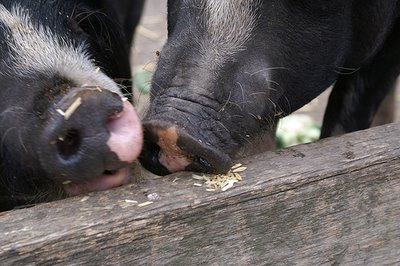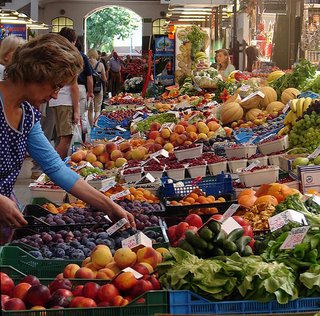What we eat

Sarsaparilla has a fascinating review of Peter Singer and Jim Mason’s The Ethics of What We Eat. The review, by Meredith, has captured many of the issues about animal food and cruelty that are close to my heart, and sparked close interest amongst readers. I thought I'd share bits of my response in the comments to Meredith's review here. This quote by Meredith sums up the issues of cruelty to animals, but her review is definitely worth reading in its entirety:
We have intricate relationships with non-humans that include some disturbing contradictions. We spend more money on our companion animals than ever, buying them toys, expensive food and medicines to prolong their lives. They’re treated as members of our families.… Yet most of us happily consume products made from creatures that have lived deprived and painful lives.I would accordingly identify myself as a ‘conscientious omnivore’, but I continue to struggle with my choices: I refuse to buy pork, and refrain from ham and other pork deli goods, but have my lapses. And I can’t give up Chinese bbq pork etc. Yet. I too am suspicious about whether the ‘free range eggs’ I’m buying are truly free range, but don’t make the effort to buy only from accredited suppliers - too much hard work.
Am I sacrificing ethics for convenience?
I crave for pork ribs the way my mum makes them, but am too cheap (or broke) to buy organic free-range pork. The prices dictate that organic pork would be a rare, festive treat.
One of the commenters, Betty, made a good point on leather and its alternatives. My brother-in-law has been an avowed vegetarian for decades (for the Singer type reasons), but still prefers leather goods because of the significant environmental damage that PVC and plastic alternatives cause.
I do think that organic farming offers better alternatives to factory farming – but for a wider range of reasons beyond animal cruelty. It is about water use, what crop (or animal) varieties are farmed, and how the soil is treated. All things we need to consider, not just how well organic animal farmers treat their beasts. But organics are bloody expensive - no questions about that, and all those promises that increasing interest in organics will bring prices down? …hah.
Yet, for the reasons I mentioned, and many others, I think shopping organic or food ethics shouldn’t be just a ‘middle class’ issue, as suggested by some Sarsaparilla readers. Many of us may not afford organics, or cruelty-free animal food production, but perhaps we all can’t afford any more what factory farming and industrial agriculture is doing to our environment and our relationship to animals.
It is quite is an interesting conundrum. Cost, convenience, taste, culture, habit, and convictions all fighting it out in the shopping basket. Vegetarianism and veganism offers the option of just not participating in the factory farming industry. I wonder though if it is a viable option for many people.
If you're interested in following this issue further, there's an interview with Peter Singer on the issues of food ethics at MotherJones. But, do read Meredith's review and the increasingly interesting and insightful comments at Sarsaparilla.
[Image: pigs at Collingwood Children's Farm, by sashy1]
Read more!




















